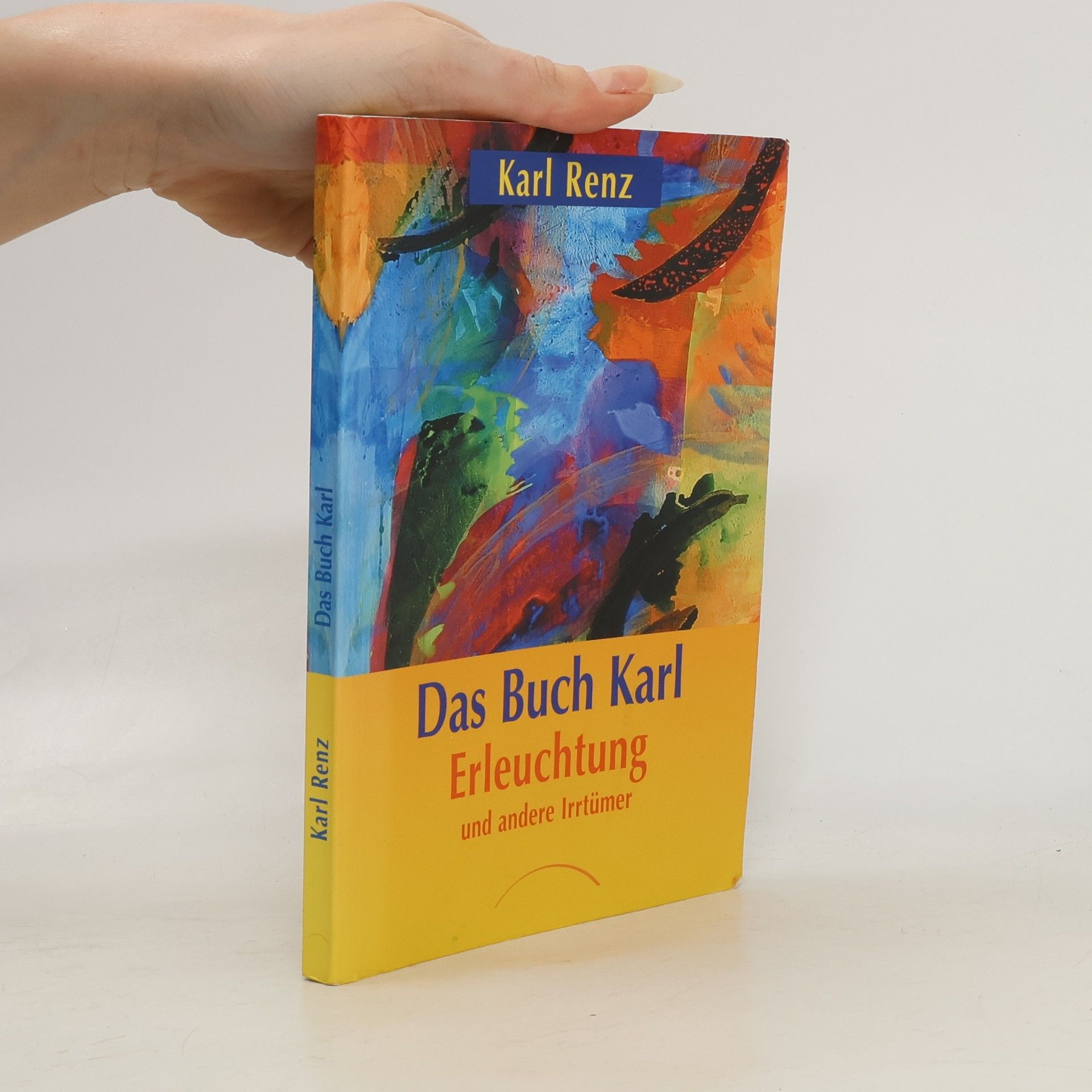Nirgends wird so viel gelacht wie in seinen Talks. Karl Renz hat dieselbe Leidenschaft für Wahrheitssuche im Gespräch wie einst Sokrates. Und denselben Spaß an Witz und Wortspiel wie Heinz Ehrhardt. Weil er selbst ohne Lehrer erwachte, ist er unbeschwert von heiligen Traditionen. Eine muntere Gesprächsatmosphäre voll Widerspruchsgeist und Zwischenrufen ist ihm lieber als jede weihevolle Aura. Dafür erteilt er auch keinen therapeutischen Rat. Stattdessen führt er alle Ideen von persönlicher Entwicklung ad absurdum. „Erst die Erkenntnis, vor dem Ich-Gedanken zu sein, entfernt die Wurzel aller Probleme.“
Karl Renz Boeken





Qu'est l'homme dans son essence ? Quelle est la raison d'être de toute cette existence ? Y a-t-il un sens profond au-delà des apparences ? Depuis de millénaires, ces questions demeurent les interrogations primordiales de l'humanité. Dans la religion comme dans la philosophie, la science ou l'art, elles ont empreint notre culture. Au-delà du temps et de l'espace, voici une rencontre significative de la sagesse chinoise et de la mystique moderne sous forme de 81 formulations de l'Indicible. Dans ce livre, nous rencontrons Lao Tseu, sage chinois qui vécut il y a 2500 ans, et Karl Renz, artiste allemand et mystique de notre temps. Ils se croisent là où temps et espace n'ont aucune signification. Karl parle précisément de cette dimension du Tao qui n'est ni tangible ni applicable. Le refus de l'homme à fonctionner dans un monde structuré et ambitieux se retrouve comme thème principal dans le Tao Te King et, ici, où sont repris les aphorismes de Lao-Tseu, l'auteur nous parle de sa propre expérience jusqu'à ce que l' éternel Maintenant , l'intemporalité, soit réalisé dans toutes les cellules de son corps de conscience. Comme dit Karl Renz, même s'il n'y a rien à comprendre, « il y a toujours quelque chose qui comprend ! ». Dans cet ouvrage, à l'aide de jeux de mots étonnants, Karl pousse la pensée au bout de ses limites jusqu'à ce que l'esprit abdique. Le Tao Te King trouve ainsi une nouvelle expression dynamique et contemporaine.
C'est la vie !
- 122bladzijden
- 5 uur lezen
Durant ces entretiens qui eurent lieu en Inde, à Bombay, il y eut beaucoup de questions portant sur les concepts de Ramesh Balsekar ainsi que sur les enseignements de Nisargadatta Maharaj, UG Krishnamurti et Ramana Maharshi. Karl Renz ne cessa d'y surprendre et d'y stimuler son auditoire par les nouvelles tournures avec lesquelles il aborda les grands thèmes de la non-dualité. Le chercheur veut dénouer les noeuds psychologiques, pacifier son mental... Or Karl ne nous conforte pas dans cette démarche. Tout au contraire. Par son verbe iconoclaste, sa désinvolture, sa négation de tout concept (neti-neti), son irrévérence... il détruit nos repères et notre questionnement jusqu'au point d'un lâcher prise radical. Bienvenue dans ce grand divertissement ! "Sois ce que tu ne peux pas ne pas être" et "Ce que tu es n'a jamais besoin de prétendre quoi que ce soit, car Cela est déjà ce qui est", nous dit-il. Cette expérience de ce que nous sommes, d'instant en instant, est la méditation. "En étant ce que tu es, automatiquement, c'est le bien-être total". Car notre nature est shanti, la paix. Mais personne ne peut jamais la posséder, car personne ne peut posséder quoi que ce soit. Etes-vous prêt à faire ce voyage qui ne peut être suivi par la pensée ? Cet époustouflant feu d'artifice verbal nous laisse un ressenti d'émerveillement et de liberté. Ne reste alors qu'une sensation rafraîchissante de légèreté et d'insouciance ou l'éclat d'un grand rire.
Commentaires sur l'Évangile de Thomas
- 191bladzijden
- 7 uur lezen
Découvert par hasard vers 1945 en Haute Egypte, le prestigieux Evangile selon Thomas date du IVième siècle. Cet écrit est composé de 114 « logia » ou dits de Jésus, qui révèlent que le Royaume est déjà présent en chacun de nous contrairement aux Evangiles canoniques. Très différent de ceux-ci, ce magnifique texte qui fait de Jésus un gnostique nous invite à une découverte par nous-même de nous-même, le Vivant, qui est notre réalité. Les gnostiques insistent sur la primauté de l'expérience immédiate individuelle.. Emile Gillabert, dont la traduction des logia est reprise ici, s'est particulièrement passionné pour L'Evangile selon Thomas . Il constatait qu'en Orient il existait de très nombreux textes non dualistes qui font défaut en Occident. La découverte de ce texte fournissait la preuve que Jésus avait prononcé des paroles non dualistes témoignant du même éveil que les grands sages d'Orient. Il a fondé l'association Metanoïa dont le but est d'approfondir et de faire connaître L'Evangile de Thomas .. Quelques décennies plus tard, l'association Metanoïa eut la bonne inspiration d'inviter Karl Renz à quatre reprises. Ce livre rapporte l'essentiel de ces commentaires. Les paroles spontanées de Karl - telle une toile d'araignée qui se tisse et se resserre - s'emparent de celui qui s'expose pour lui bloquer toute issue. Un écho non duel et non conventionnel de la gnose véritable.. « Il nous faut, comme nous y invite Jésus, nous dépouiller de tout vêtement personnel. La nécessité de cet abandon est soulignée d'un bout à l'autre des 114 logia », souligne Emile Gillabert, rejoignant ainsi Karl : « Cela, c'est la nudité absolue. Et cela, c'est Jésus . ».
Tao Te Karl
- 152bladzijden
- 6 uur lezen
In diesem Buch begegnen sich Laotse, ein chinesischer Weiser, der vor 2.500 Jahren lebte, und Karl Renz, ein deutscher Künstler und Mystiker unserer Zeit. Sie treffen sich dort, wo Zeit und Raum keine Bedeutung haben, und wo das Denken an seine Grenzen kommt. Die kurzen, prägnanten Kapitel enthalten Mitschnitte aus Satsangs - oder "Selbstgesprächen", wie Karl Renz seine Talks auch nennt - in denen er mit atemberaubendem Wortwitz über das spricht, was nicht gesprochen werden kann. Dabei ist zu spüren, dass alles, was gesagt wir, direkt aus dem Nichts fließt und den Teil in uns anspricht, der ebenfalls im Nicht zu Hause ist. "Der Kopf muss nicht verstehen," sagt Karl, "denn irgendetwas versteht immer!"So findet das Tao Te King eine völlig neue, atemberaubend zeitgemäße Form.